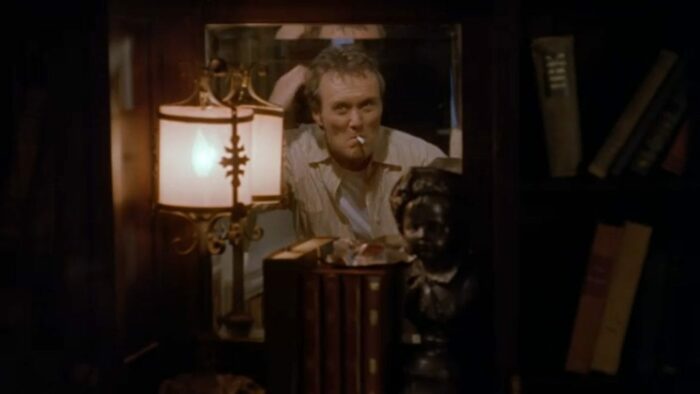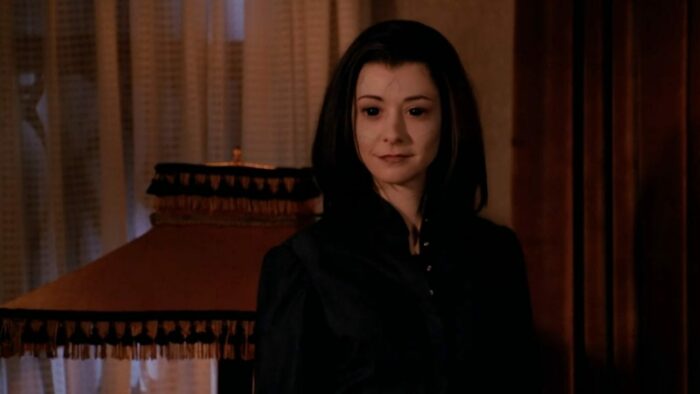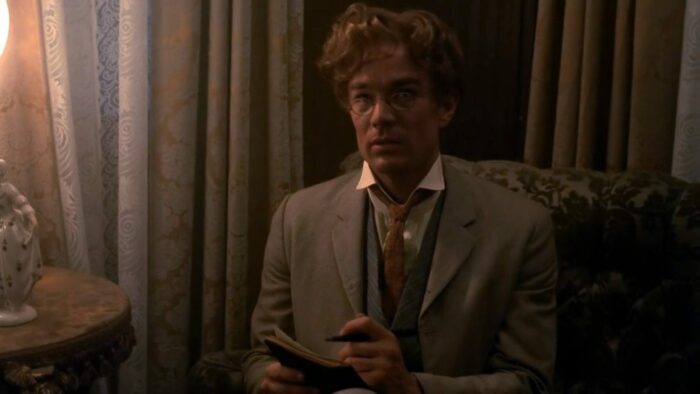There are many strong central themes in Buffy the Vampire Slayer, but one of the most deeply personal and nuanced of these is identity. Adolescence, growing up, and finding yourself are all a huge part of Buffy and other characters’ journeys throughout the show. But it’s not just the teenagers who have identity crises. Most major characters in Buffy are shown to have different personas linked to their self-perception.
This exploration of sense of self is often aligned with name changes. Names are the strongest personal identifiers, so a change of name usually signifies a shift in identity, or a desire to shift external perception to reflect internal identity. In Buffy, certain names are allocated to characters’ coexisting yet polarising selves to create a clear distinction between them. Not only does this apply to villainous alter egos, but also different stages of some characters’ lives. Each name has an association with a particular time or phase of self-discovery, and all are important to the characters in different ways.
Attention is drawn to this technique most overtly with Anne Steele, a character who only appears in two episodes of Buffy and three of Angel. When we first meet her in Buffy S2E7 ‘Lie to Me’, she’s a vampire-wannabe going by the name Chanterelle. After being saved from the vampires by Buffy, she makes a fresh start in L.A. Using the name Lily, she bumps into Buffy working as a waitress in S3E1 ‘Anne’ and is seemingly happy living a freer lifestyle with her beloved boyfriend Rickie. However, he’s implied to be controlling of her, and actually chose the name Lily for her. Rickie is killed in the episode, and Lily finds herself presented with another new beginning.
Giving her the apartment she was renting and her job, Buffy even allows Lily to take the name she was going by: Anne. She’s still using this name in her next appearance in Angel S2E12 ‘Blood Money’. Running a shelter for teen runaways like herself is Anne’s vocation, and she comfortably settles into the role that she forged in her own independence. The last time we see her, in the Angel finale ‘Not Fade Away’, she’s working the same job under the same name. Multiple identity and name changes were an integral part of growing up for Anne.
Aside from this side character, numerous name changes are also a significant part of the main characters we know and love in Buffy, albeit in a slightly subtler way. First, let’s take a look at the humans.
Buffy

Although ‘Buffy’ is usually short for ‘Elizabeth’, it appears that Buffy is the given name of our protagonist. School records show ‘Buffy’ as her full forename, she exclaims “my mother gave me that name!” when Spike says Buffy is a “terrible name” in ‘Something Blue’, and when she dies in the Season 5 finale, her gravestone reads ‘Buffy Anne Summers’. This implication that Buffy is her full, legal forename is pretty funny considering it’s a rather daft-sounding name. The show’s title, Buffy the Vampire Slayer, is an intentional juxtaposition of a quirky, silly name next to a phrase that conveys horror. It’s exactly what it says on the tin. In terms of the character herself, Buffy’s name acknowledges that she’s unique since the name is so rare, and also underestimated; people are likely not to take her seriously with a name like that, but in reality she’s a force to be reckoned with.
Demons and vampires often refer to Buffy as ‘the Slayer’ when fighting her—in all fairness, they probably don’t know her actual name, but it emphasises the split between her life as a normal girl and secret duty of being a vampire slayer. Despite Buffy’s power being highlighted when called ‘the Slayer’, the term also reduces her to a supernatural being. We know that Buffy dislikes this, since she frequently takes issue with being restricted by her duties, and wishes to be seen as a fully-rounded person instead of just ‘the Slayer’.
After killing Angel in the Season 2 finale, Buffy briefly moves back to L.A. and during this time goes by her middle name, Anne (also the title of the Season 3 opening episode). When Lily calls the name ‘Anne’ to get her attention, she doesn’t respond, but she does still respond to ‘Buffy’. This represents a disconnect with her constructed identity and a desire for things to go back to normal, even if she isn’t ready yet. When Ken takes Buffy down to the hell dimension, he says to her, “I know you… Anne. So afraid. So pathetically determined to run away from whatever it is you used to be. To disappear. Congratulations. You got your wish.” Changing her name to Anne signifies an attempt to escape herself, and choosing her more ordinary middle name personifies her wish to go about her life unnoticed. As mentioned previously, Lily takes the name Anne at the end of the episode, which Buffy is happy about. By this point, Buffy is ready to move on and face life in Sunnydale again, so she ditches the name Anne.
The only other time Buffy goes by a different name is in S6E8 ‘Tabula Rasa’. Willow’s attempt at erasing both Buffy and Tara’s memories backfires, giving all of the Scooby Gang a case of complete amnesia. The episode title itself is Latin for ‘scraped tablet’, essentially denoting a blank slate. Without any knowledge of who they are, the characters are given a fresh start, a chance to redefine their personalities. As opposed to characters like Willow and Xander who have ID cards on their person at the time the spell kicks in, Buffy has no indication as to what her name could be. Instead, she picks the name ‘Joan’. Like ‘Anne’, the name is rather bland and dull, especially in contrast with ‘Buffy’. At this time in the show, Buffy is going through a period of severe depression after being resurrected from the dead. Her heart isn’t in slaying anymore, and she’s struggling to communicate her feelings to her friends and family. Therefore, Buffy’s sense of self has deteriorated into total numbness, and a simple name like Joan echoes this.
Giles

Rupert Giles most frequently goes by just ‘Giles’ throughout the show. Since he’s the school librarian in the first three seasons, the Scoobies initially refer to him as ‘Mr Giles’, as does Joyce Summers. It doesn’t take long for them to gain enough familiarity with him to drop the ‘Mr’. However, being a figure of authority, it seems he goes by his surname as a sign of respect, or at the very least, acknowledgement of his position as an adult and father figure.
Few people call Giles by his first name. The characters that do are usually adult friends or love interests, such as Jenny Calendar and Olivia Williams. Calling him ‘Rupert’ is mostly a sign of friendliness and comfort, but also to represent how they’re on the same wavelength as people of a similar age. Quentin Travers, a Director of the Watchers’ Council and colleague of Giles’, uses ‘Rupert’ as well, likely as one of the closest links to his background. The only breaks from these general rules are Spike often calling him ‘Rupert’ to be difficult and annoying, and Dark!Willow using ‘Rupert’ during their confrontation at the end of Season 6. With her spiteful state of mind at this point, Willow is using his first name in a degrading manner to highlight how his position of authority has slipped.
In S2E8 ‘The Dark Age’, we discover that Giles was in a group that recreationally practised dark magic in his youth. During this time, he went by the nickname ‘Ripper’. The name is very edgy and associated with a rebellious, dangerous period of Giles’ life. Only people who knew him at this time call him ‘Ripper’, such as Ethan Rayne, a recurring antagonist. Giles clearly doesn’t like being called ‘Ripper’ since he no longer identifies with the person he was when he went by the name. Ethan uses the nickname in a taunting way; he’s extremely chaotic, and since he obviously never left the dark magic behind, he seems to be attempting to tempt Giles back into that reckless mindset as well. We do see this happen as a result of Ethan’s magic in S3E6 ‘Band Candy’, as each of the adults in Sunnydale eat chocolate that causes them to regress into their sixteen-year-old selves. Giles removes his glasses, dresses more casually, starts smoking, and calls himself ‘Ripper’ again. His bad boy persona is short-lived and played for comedy, but it’s still an integral part of his character.
Willow

Willow Rosenberg only goes by ‘Willow’ or the nickname ‘Will’ to her close friends (i.e. Buffy and Xander). Even Vampire!Willow in Season 3’s ‘The Wish’ still goes by standard ‘Willow’, despite having a very different persona. However, she has her fair share of identity insecurities that are always tied to the kind of person she was in high school. More so, this is often attached to her name.
For example, in Willow’s dream in ‘Restless’, Tara worries “that we haven’t found her name”; although this is in reference to their cat Miss Kitty Fantastico, all her dialogue concerning not knowing who she is and that she’s “not all grown yet” applies directly to Willow. There’s a lot of focus on her friends finding out “the truth” about her, linking to anxieties about never having grown up past her nerdy, high school self. When Willow shows up to the production of Death of a Salesman, Buffy tells her that she’s “already in character” and wearing a “costume”. Names, costumes, characters—these are all references to Willow believing that any character development she’s been through past Season 1 is all a disguise, and that she’s really stuck that way forever.
Willow’s disdain for her younger self is most obvious when she transforms into Dark!Willow in the Season 6 finale. When Buffy says to her, “You have to remember you’re still Willow” in an attempt to bring her back from the brink, Willow scoffs and replies:
Let me tell you something about Willow. She’s a loser. And she always has been. People picked on Willow in junior high school, high school, up until college. With her stupid mousy ways. And now? Willow’s a junkie.
She outright rejects the name ‘Willow’ in her current state here, instead using the name not so much to refer to herself in third person, but to refer to a weaker, less-developed version of herself. We know she’s still Willow, but she’s detaching herself from the name in order to rise above the low self-esteem she attaches to it. In doing so, she also makes herself seem less human, which she is becoming by surrendering to the darkness.
In S7E1 ‘Lessons’, Giles is mentoring Willow as she recovers from the devastation she wrought as Dark!Willow. He asks her, “Do you want to be punished?” to which she replies, “I wanna be Willow.” By recognising her name and synonymising this with being herself, Willow is learning to embrace who she is—all parts of herself, even the parts she perceives as weak. As Giles says to her, “we all are who we are, no matter how much we may appear to have changed.” Since her days as a mousy high schooler, through her descent into darkness, and out the other side, Willow has always been Willow. Trying to compartmentalise these different parts of her journey proved to be unhealthy, but accepting all of it as significant aspects of her identity is a big part of her recovery. With this, she can truly improve her self-confidence.
So, the humans are complex as it is. Demons, on the other hand, play with the idea of assigned names and chosen names as opposed to standard nicknames or changing perceptions of a given name. The distinction is a lot more clear cut. Here’s our main monsters.
Angel

Before being sired, Angel’s given human name was Liam. It’s a very common Irish forename, which reflects his human status as a blank slate. Human Liam is presented as a man with no ambitions and nothing to live for, whiling away the days by drinking and sleeping with women. He’s boring and empty, therefore attached to an ordinary name.
On becoming a vampire, Liam chooses the name ‘Angelus’. As we see in the Angel Season 1 episode ‘The Prodigal’, he returns to murder his family after rising from his grave. He tells his father that he was invited in by his little sister: “She thought I returned to her—an angel.” This description is likely why he picked his name, extending it into ‘Angelus’ to make the distinction that he’s evil. In historical texts, he’s also referred to as “the one with the angelic face” and “the demon with the face of an angel” because of his good looks. It could also be a reference to a category of serial killers who work as medical professionals and murder patients under their care, known as ‘Angels of Death’ or sometimes ‘Angels of Mercy’. All-in-all, ‘Angelus’ is a subversion of religious saviour imagery, making the vampire appear all the more disturbing and dangerous.
When Angelus is cursed with a soul right before the start of the 20th century, he soon abbreviates his name to ‘Angel’. The conversion to moral goodness is reflected in this name change. He makes a clear separation of the monster inside him and the good man he’s striving to become—the most obvious example of how names intersect with identity in the show. Each time Angel loses his soul, such as the ‘Surprise’/’Innocence’ two-parter in Buffy Season 2, he starts calling himself ‘Angelus’ again. When he announces his lack of soul to Spike and Drusilla, he says, “What can I say? I was going through a phase.” This implies that Angelus is his natural state, whereas ‘Angel’ is inevitably a temporary lapse of the real him.
However, when Jenny later asks, “You’re not Angel anymore, are you?”, he replies, “Wrong. I am Angel. At last!” There is some confusion with the two names here, but Angelus is essentially saying that even ‘Angel’, the good part of him, is evil deep-down. That’s who he’s supposed to be, who he really is. There is no separation; Angel and Angelus are one and the same. Much like Willow, Angel must accept both of these personas as important aspects of himself in order to be at peace.
Spike

In direct comparison to Angel, Spike’s human name was William, the English version of Liam. Again, the name is very common to represent how he was unrecognised and underestimated by the people around him as a human. Rejecting his love for her, Cecily tells him in a flashback, “You’re nothing to me, William. You’re beneath me.” For Spike, the name is therefore associated with being a nobody.
Other people at the party in the flashback in ‘Fool For Love’ make reference to his nickname ‘William the Bloody’. When we first hear this name in Season 2, we assume it’s an early vampire name since it sounds threatening. However, it’s revealed that the name was coined because of his “bloody awful poetry”. It’s an amusing subversion of expectations, and also plays into the idea that Spike was actually rather pathetic before becoming a vampire, contrary to what he wants Buffy to believe.
On occasion, Spike is still referred to as ‘William’, most notably by Buffy when she breaks up with him in S6E15 ‘As You Were’. In cutting any romantic or sexual ties with him, she says, “I’m sorry, William”. The break-up is enough of a gut-punch to Spike, but Buffy using his given human name rubs even more salt in the wound. From her perspective, it appears she’s finally trying to humanise him, so it almost feels like a sign of respect. However, due to the association with a less powerful, weak self (again, reminiscent of Willow), Spike likely finds the name insulting. A few times throughout Season 7, Anya also uses the name ‘William’, such as when she’s coming on to him in ‘Sleeper’. It’s an odd moment, and her choice of name makes it stick out even more. At the time, the Scoobies are suspecting Spike of killing again, so perhaps Anya is using his human name to optimistically consolidate him in both her and his mind as a non-threat.
Opting for the name ‘Spike’ after becoming a vampire was likely due to his weapon of choice being railroad spikes, which he would use to torture his victims. The name ties in nicely with his punky-goth aesthetic and persona. He’s a rebellious anarchist at heart, rejecting structure and rules, and ‘Spike’ has that kind of energy. Interestingly, Spike doesn’t change his name when he regains his soul at the end of Season 6. Instead of making a distinct separation between his ensouled and soulless selves like Angel does, he chooses to acknowledge it all as the same person. In a way, it’s part of his redemption arc; Spike accepts that he is still himself, and that he committed horrific acts of murder and torture, not some hidden-away part of him.
Anya

The development of Anya’s name is very similar to Angel’s: given human name to demon name to abbreviated version of demon name. Her human name was ‘Aud’, meaning “prosperous”. This is a nod to her affiliation for money as a mortal. Another interpretation of the name is “deserted” or “empty”; like Angel and Spike, this reflects her human status as a sort of prototype for the Anya we know and love.
After turning her cheating husband into a troll, Aud was visited by D’Hoffryn. He recruited her as a vengeance demon and gave her the name ‘Anyanka’. She asks him, “Why do you keep calling me that? My name is Aud”, to which he says, “Perhaps, but Anyanka is who you are.” This links to the idea that original names can be superficial, whereas adopted names reflect true identity. However, ‘Anyanka’ is still a name someone else chose for her, even though she grows into it during her time as a vengeance demon. We later discover that Cecily from Spike’s past has also become a vengeance demon—Anyanka’s best friend, no less. Her assigned name is Halfrek.
On becoming mortal, Anyanka is shortened to ‘Anya’. Assimilating into human society is easier with this name, and cuts ties with her previous demonic status. When interacting amongst humans, Halfrek also goes by a nickname: Hallie. It’s more played for comedy with her, as humour is generated from the subversion of a threatening demon being a bubbly best friend to Anya. Although she starts going by Anyanka again when she reverts back to a vengeance demon in Season 6, Anya clearly prefers her chosen nickname.
Season 7’s ‘Selfless’ deals with Anya’s identity crisis, as she is uncomfortable with her status as a vengeance demon. D’Hoffryn purposely uses the name ‘Anyanka’ to refer to her as a constant reminder that a) she’s a demon and b) he made her who she is. He points out that no one is “bothered to find out what Anyanka herself really wants”, to which Xander retorts, “her name is Anya.” Even though Xander is closer to the mark, he’s still speaking on Anya’s behalf. She’s been defined by men throughout her life; first her husband Olaf, then her boss D’Hoffryn, then her almost-husband Xander. In the episode’s flashback musical number, Anya takes pride in taking Xander’s name in marriage. She proudly sings, “I will be his Missis! Mrs. Anya Christina Emanuella Jenkins Harris.” This name is grounding for her sense of identity.
Without this marriage, without her job as a vengeance demon, Anya is on her own for the first time. She tells Xander that she’s always “just clung to whatever came along”, and is worried that she’s “really nobody”. But by rejecting her assigned names and sticking with her own nickname, Anya, she can start down the path of self-realisation.
Exploration of identity is extremely in-depth in Buffy, and names are an interesting way of navigating this. A fair few characters go through dark phases, or periods of uncertainty regarding their true selves. Ultimately, embracing every single part of yourself makes way for a fully developed and fulfilled person. That way, we can move on and make peace with ourselves.

